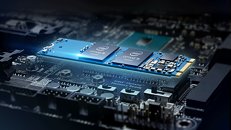- Joined
- Aug 20, 2007
- Messages
- 22,347 (3.43/day)
- Location
- Olympia, WA
| System Name | Pioneer |
|---|---|
| Processor | Ryzen 9 9950X |
| Motherboard | MSI MAG X670E Tomahawk Wifi |
| Cooling | Noctua NH-D15 + A whole lotta Sunon, Phanteks and Corsair Maglev blower fans... |
| Memory | 64GB (2x 32GB) G.Skill Flare X5 @ DDR5-6200(Running 1T no GDM) |
| Video Card(s) | XFX RX 7900 XTX Speedster Merc 310 |
| Storage | Intel 5800X Optane 800GB boot, +2x Crucial P5 Plus 2TB PCIe 4.0 NVMe SSDs, 1x 2TB Seagate Exos 3.5" |
| Display(s) | 55" LG 55" B9 OLED 4K Display |
| Case | Thermaltake Core X31 |
| Audio Device(s) | TOSLINK->Schiit Modi MB->Asgard 2 DAC Amp->AKG Pro K712 Headphones or HDMI->B9 OLED |
| Power Supply | FSP Hydro Ti Pro 850W |
| Mouse | Logitech G305 Lightspeed Wireless |
| Keyboard | WASD Code v3 with Cherry Green keyswitches + PBT DS keycaps |
| Software | Gentoo Linux x64, other office machines run Windows 11 Enterprise |
Microprocessor giant Intel has launched a new page dedicated to its 3D XPoint-based Optane memory solution, a technology that it jointly developed with memory manufacturer Micron back in 2015, and was supposed to be on the market by 2016. The company missed that date; however, the technology is still interesting to enthusiasts and power users alike, due to its promises of both high speed and large capacity, a seemingly unattainable combo in today's markets.
Unfortunately, it seems that any system built around when Optane was announced will not be able to run Optane-based SSDs. In the system requirements section of its page, Intel has indicated that Optane will not run on anything earlier than a Kaby Lake based CPU. No exceptions. Yes, that includes Skylake, Broadwell, and pretty much everything else besides Kaby Lake. You will also need a 200-series chipset or newer.

Skylake is amongst the most surprising of these exclusions, because it is nearly identical architecture-wise to Kaby Lake and a Skylake based chip was once used in a Optane test demonstration.
View at TechPowerUp Main Site
Unfortunately, it seems that any system built around when Optane was announced will not be able to run Optane-based SSDs. In the system requirements section of its page, Intel has indicated that Optane will not run on anything earlier than a Kaby Lake based CPU. No exceptions. Yes, that includes Skylake, Broadwell, and pretty much everything else besides Kaby Lake. You will also need a 200-series chipset or newer.

Skylake is amongst the most surprising of these exclusions, because it is nearly identical architecture-wise to Kaby Lake and a Skylake based chip was once used in a Optane test demonstration.
View at TechPowerUp Main Site
Last edited:





